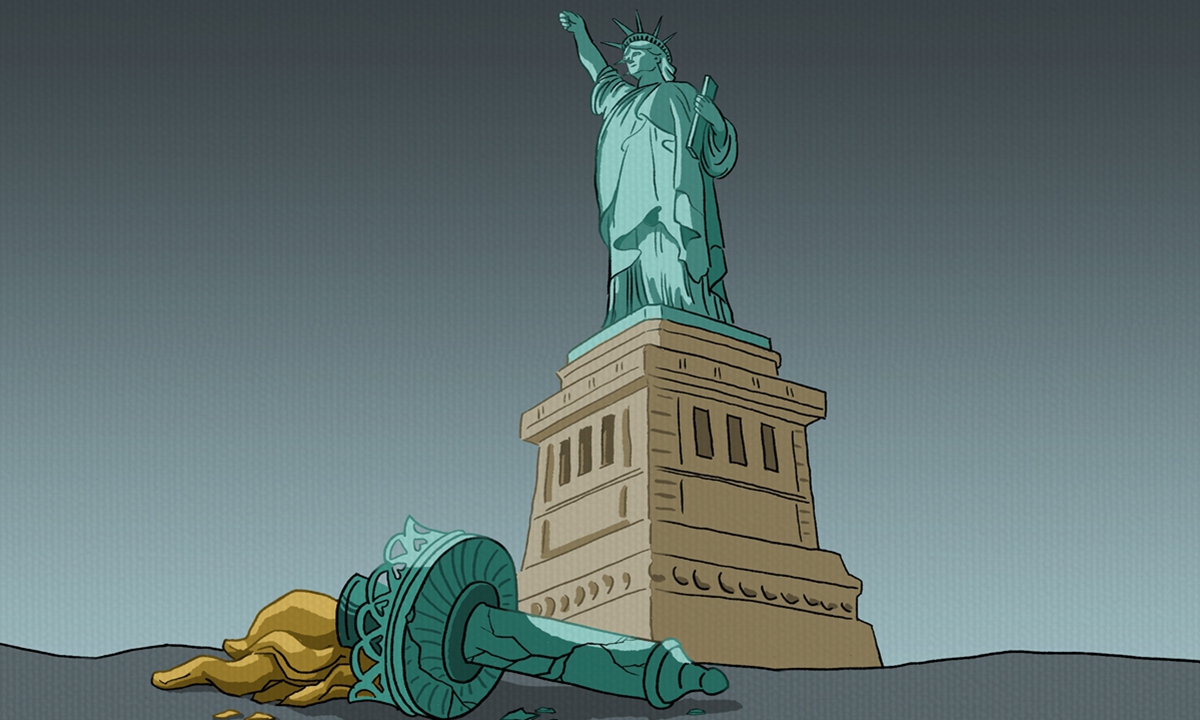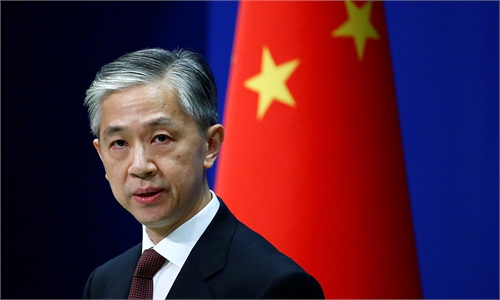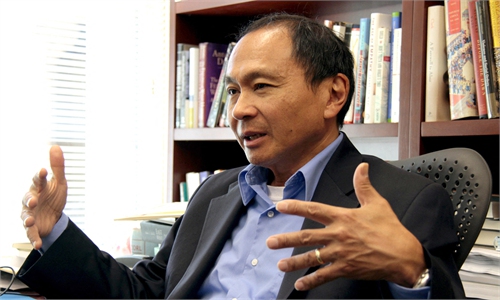
Degradation in the Western system Illustration: Liu Rui/GT
These days, some US scholars seem to have been flushing truth and objectiveness down the toilet while enshrining "political correctness" when making analyses, not just once, but time and again. As a result, fewer people are buying their words.Recently, Hungarian Prime Minister Viktor Orbán met with US political scientist John Mearsheimer. Balázs Orbán, the prime minister's political director, posted a tweet saying "at the meeting, they discussed the war in Ukraine and agreed that it is the most dangerous conflict in decades and therefore must come to an end as soon as possible." It was captured by Francis Fukuyama, who commented on the tweet, "John is moving from realist to full-on MAGA." Balázs Orbán made a hit back, "Perhaps it is still a better position to be moving somewhere than to be stuck in one place, like at the End of History."
What does Fukuyama mean by connecting either the meeting or the viewpoints of Mearsheimer with MAGA? He made no explanation. But Fukuyama does leave a strong impression - he does not think the way a scholar thinks, but he thinks as a politician who tends to simply jump into a conclusion and pins labels on other politicians whom he disagrees with, or dislikes, Shen Yi, a professor at Fudan University, told the Global Times.
After the outbreak of the Russia-Ukraine conflict, criticisms and refutation of Mearsheimer in the US sharply rose because he believes the ongoing crisis in Ukraine is the fault of the West, namely the US and NATO. This is not "politically correct." In other words, there is no room to debate in the US about the right and wrong over the conflict, and the only "culprit" must be Russia.
Since Mearsheimer's view runs contrary to the US mainstream, he has drawn growing discontent from American political and academic circles. Fukuyama's response is thus not an individual case, but represents the general attitude among US elites, said Yang Xiyu, a senior research fellow at the China Institute of International Studies.
No one bothers to take the view - the war should come to an end as soon as possible - seriously. Just as Fukuyama does not bother to spell out the logic of claiming Mearsheimer is "full-on MAGA." The logic does not matter anymore, as pinning political labels on one another has become American elites' new favorite habit.
American political and academic atmosphere is drifting farther and farther away from seeking truth, objectivity, impartiality and fairness, which they once valued, Yang noted.
The reason why "the end of history" was once vigorously touted is that the theory, published in 1992 by Fukuyama, rode on the wave of the end of the Cold War. At that time, questioning the concept could be argued as challenging Western conventional cognition - the end of the Cold War and the disintegration of the Soviet Union meant the overall victory of Western ideology.
The theory put the West under anesthesia, making them unconscious of the contradictions and flaws of capitalism, as it hails that Western system represents the best choice for mankind, and that the US is the beacon in this regard. Thanks to such a cognitive framework, the US has lost the ability to reflect and the driving forces to reform, but it made the US in the habit of only indulging in the hubris of pointing fingers at others, said Shen.
But the most vital and difficult part of the tasks for political scientists is supposed to be seeking flows in their systems and raising solutions. Unfortunately, "the end of history" is like a narcotic pill, and Fukuyama and his like are addicted to it, Shen added.
Fukuyama has been stuck in his outdated theory for so long, as the US has confined itself to the pride and prejudice, represented by "the end of history." Granted, US capitalist system did create some miracles over the past decades. But the arrogance, developed along with the miracles, has blinded and paralyzed the country from seeing and fixing its mounting piles of problems.
The recent debate between Balázs Orbán and Fukuyama indicates people are wising up to the values and ideologies that the US has been peddling. They know well that history has already flipped over the page of "the end of history."
Some political figures in the West have started to return to the fundamental elements of politics from a pragmatic perspective, such as on issues over economic development, redistribution of welfare, how to jointly promote global governance, share the costs and benefits together, and build a fairer, more just order, Shen told the Global Times.
The Earth does not revolve around US politicians and scholars. And as the world is so diverse, no single theory of any kind can set the tone for the development of mankind. An ironic phenomenon may prove it - "most people do not raise 'the end of history' any more except to mock it," said Shen.
Those who were once glorious can one day become a laughingstock. This is a fun part of history. Maybe the US should ponder this: If it keeps sticking to the wrong path without carrying out structural reforms, will its system be ended by history one day?


